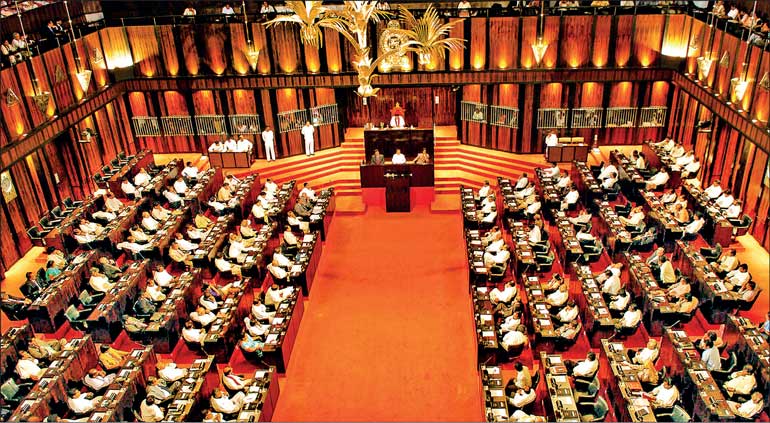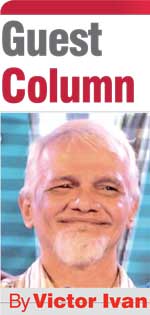Wednesday Feb 18, 2026
Wednesday Feb 18, 2026
Friday, 17 June 2022 00:19 - - {{hitsCtrl.values.hits}}

An all-party consensus must be reached without delay
 At this point Sri Lanka is lying on the verge of falling into a more dreadful abyss from what it is now in. So much so, the country will inevitably fall into a state of primitivism not easy to recover from unless appropriate and prompt measures are taken to prevent it sinking further down from the present abyss it is now in. But, the aggressive forces and the society that demand and advocate for a change of the political system and current regime does not seem to realise the horrible reality facing Sri Lanka.
At this point Sri Lanka is lying on the verge of falling into a more dreadful abyss from what it is now in. So much so, the country will inevitably fall into a state of primitivism not easy to recover from unless appropriate and prompt measures are taken to prevent it sinking further down from the present abyss it is now in. But, the aggressive forces and the society that demand and advocate for a change of the political system and current regime does not seem to realise the horrible reality facing Sri Lanka.
The extraordinary political situation that prevails at the moment is such that it would not be possible to change the ruling party immediately. Also it is not the right time to refrain from supporting it branding it as a corrupt and unprogressive force. It can be viewed as a special moment to join hands with the ruling party regardless of its corrupt and awesome image in order that the country is rescued from the present abyss it is now in while preventing it falling into the next layer, the consequences of which could be worse. Under the circumstances, anything like systemic change and regime change should take place within a legitimate constitutional framework that Sri Lanka could tolerate at this particular moment without compromising the basic objective outlined above.
The “People’s Movement for Reform” has designed and framed its reform program after taking into consideration the particular stage of the crisis we are currently in. It has been designed in a manner that all parties represented in Parliament could be brought under an all-party interim framework so that they could work together to resolve the balance of payments crisis while a reform program aimed at making a profound change in the system could be implemented in two phases.
The proposed reform program has been designed to be implemented in two phases considering that holding of an early election would be an essential condition for resolving the crisis. Accordingly, after the determination of a suitable system of governance for the country, the most important element to be included in the first phase of the program would be to make necessary electoral laws required for ensuring the conduct of free and fair elections, and then hold an election to elect public representatives to the legislature. It should also be an election to elect representatives to the Constitution Formulation Committee as well.
The Constitution Formulation Committee, consisting of 50 Members of Parliament and 100 Members of the public will act as the authority on the planning of the entire reform program, formulation of necessary drafts and the reforms to be introduced until the end of the first phase. The same committee will also be assigned with the responsibility of planning and drafting the reform program for the second phase. It will be enacted as a compulsory statutory obligation to be fulfilled by the Government and Parliament coming into power after the elections.
The first phase of the reform program should be completed in no more than one year, and the other reforms to be introduced in the second phase, including the “participatory constitution making” should be completed in less than three years. Whatever may be the government that comes to power there should be an all-party government until the end of the reform program.
Making it a reality
The proposals of the reform program have been included only as a specimen for understanding the length, breadth and depth of the reform program that Sri Lanka needs and not with the view to stress that implementation of the proposals contained therein is essential. This is a reform program of public participation. Therefore, the people have the right to make proposals. The entire program will be implemented in a transparent manner and in such a way that the public can be actively involved in it.
This program (a) provides a solid foundation for the formation of an all-party government to resolve the crisis facing Sri Lanka. (b) This reform program also provides Sri Lanka with a solid foundation for securing international assistance at this time. (c) It also provides a strong constitutional framework to bring about a profound change in the system that is rotten and stinks. (d) It will provide space for holding an early election that can be contested without black money (e) it provides a solid foundation for integrating the divided nation and building a modern nation based on the principle of equality. (f) It will provide the opportunity to develop a new system of governance based on the rule of law and a modern constitution based on public participation.
The proposed reforms program was approved by President Gotabaya Rajapaksa first, and later by Prime Minister Ranil Wickremesinghe. At a discussion held with Sajith Premadasa, the Opposition leader on 10 June, not only that he accepted the reform program, but also called for a broader discussion on 13 June to raise awareness of it. The 13 June meeting was attended by a group of parliamentarians representing the official hierarchy of the Samagi Jana Balawegaya (SJB) and a group of political leaders and parliamentarians representing the opposition alliance.
Of the opposition parties represented in Parliament, only the ones led by Champika Ranawaka and the Janatha Vimukthi Peramuna were not present. The discussion lasted for nearly four hours and it went on enthusiastically. The reform program and the need for having such a program, was accepted by all. Several views were expressed of the need for having an all-party government formed without delay.
Sri Lanka seems to be moving towards recognising the importance of directing the country for adopting a comprehensive program of structural reforms that will bring about a profound and positive transformation of the political system. Needless to say that this is a very important trend. We look forward to discussing about this with the JVP, the 43rd Senankaya (Brigade), the SLFP and various groups representing the ruling party. An all-party consensus must be reached without delay.
In my opinion the President, the Prime Minister and the Leader of the Opposition should be made the three main pillars of the country in the face of this crisis. The President as the Head of State should be the authority who oversees all affairs of the state. The Prime Minister should be the authority that oversees the balance of payments crisis and the affairs of the government. The Leader of the Opposition should be the authority overseeing the reform program.
Such a combination will not only help unite the country but also provide a solid foundation for the country to emerge from its present abyss preventing it falling into the next stage of it which could be a worse scenario. Eventually the demands of the younger generation will become something that the country could achieve, not through harsh means, but through a smooth constitutional framework.